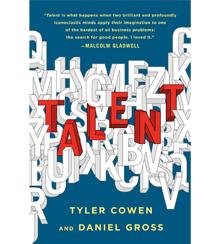How talented are you at spotting talent?
A new book makes the case for a more open-minded approach to hiring.
Talent: How to Identify Energizers, Creatives, and Winners Around the World
by Tyler Cowen and Daniel Gross (St. Martin’s Press, 2022)
“You can help the world a great deal by being a better judge of talent.” So say Tyler Cowen and Daniel Gross in their new book, Talent: How to Identify Energizers, Creatives, and Winners Around the World.
Cowen (a well-known writer and economics professor) and Gross (an entrepreneur and investor, and no relation to the Daniel Gross who edits strategy+business) believe that the most valuable and least understood resource necessary for dynamic growth today is talent—untapped potential of smart individuals with a natural capacity for self-improvement. And that this vital mojo is often obscured by what they identify as today’s prevailing bureaucratic approach to spotting high-potential employees, which relies upon safe, unimaginative, and ultimately stifling methods.
That’s why they aspire to a better way to find and hire individuals with the right mindset for unlocking the potential in today’s economy. In their words, they are seeking to tap “people who generate new ideas, start new institutions, develop new methods for executing on known products, lead intellectual or charitable movements, or inspire others by their very presence, leadership, and charisma, regardless of the context. These are all people who have the gift of improving the world by reimagining the future as a different and better place.”
Such “rare, transformative talent” is generally underrepresented in today’s economy, they write, resulting in a costly misallocation of talent away from where it’s most needed. Cowen and Gross focus on finding these unrecognized, misplaced stars. Disappointed with traditional methods of finding new hires that rely on a safe, flawed approach that “seeks to minimize error and loss, and…prizes consensus above all else,” they promote a more open-minded talent search.
“Identifying underrated talent is one of the most potent ways to give yourself a personal or organizational edge,” they say. (They also reveal a bias toward hiring for creative positions and high-growth ventures that are often run by private equity or funded through venture capital.)
Identifying underrated talent is one of the most potent ways to give yourself a personal or organizational edge.”
The authors’ new guide is an insightful—albeit occasionally annoying—book that can improve your ability to spot and hire individuals who will grow their abilities and help your enterprise thrive. Talent offers thoughtful ways to assess the nascent potential of job candidates. Beyond native intelligence (which the authors, in fact, discount as a hiring criterion), recruiters should scout how well an individual practices self-improvement, they say.
The two offer a handful of wise tactics to gauge a potential hire’s potential talent. For example, they like to ask candidates, “What are the open tabs on your browser right now?” as a means of discovering their interests and habits. “The very best performers don’t stop practicing for very long,” they assert, noting that a candidate’s pursuits reveal more relevant data than do stories about people’s prior jobs and can also track an individual’s bent for self-improvement. Cowen and Gross identify these habits as “one path toward continuously compounding learning and performance.”
The authors are best when they challenge prevailing wisdom and offer simple tips for better hiring. Setting an initial interview in a public venue can provide opportunities to see how candidates interact with strangers, while providing other cues about their ability to improvise in new settings. So, too, can asking a question that exposes beliefs, such as, “What is one mainstream or consensus view that you wholeheartedly agree with?” Or, “What views do you hold almost irrationally?” They also dig into ways to boost the yield from online interviews, a modern convention packed with many potential false clues about character. One surprising aspect of the book is the authors’ counsel to not rely too much on the candidate’s ability to be articulate during an interview, which they say is usually overrated—“most of all, by people who are smart.”
Perhaps the most useful aspect of the book involves an effort to help people scrub their biases regarding gender and disability. The authors challenge the negative connotations of people with autism or ADHD and instead explore the merits of neurodiversity in the workplace. Cowen and Gross argue that individuals with such ostensible disadvantages often compensate in ways that lead to greater skill or achievement.
And yet these good ideas are increasingly hard to harvest over the course of the book, wherein general assertions are made by drawing from the exemplary habits of a well-known circle of top achievers—begging the question of whether these lessons can apply to mere mortals like us. We hear about the instructive practices of individuals such as Pablo Picasso, Paul McCartney, Michael Jordan, Taylor Swift, Aretha Franklin, and Richard Branson. This proof by name-dropping undercuts what are otherwise useful tips for recruiters and job seekers alike.
Relying on already available source material also suggests that the authors have done scant original research for their book. Drawing mainly from the public domain, they sacrifice the chance to help readers spot potentially useful clues from more quotidian individuals. I would have valued more prescriptive insights from them regarding habits and personality traits to seek out.
That said, this book will challenge you to think deeper about how to gauge talent, and guide your search for the right people for the right gig.
Author profile:
- Tom Ehrenfeld is a freelance writer and editor based in Cambridge, Mass. Formerly a writer/editor with Inc. magazine and Harvard Business Review, he is also the author of The Startup Garden. He has written extensively about lean enterprise; nine books that he has edited have won the Shingo Publication Award.




